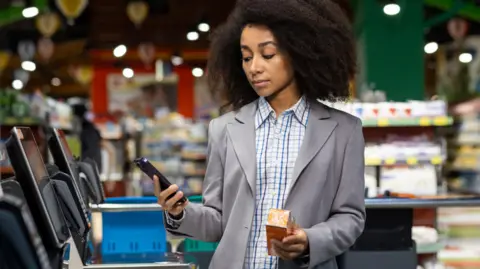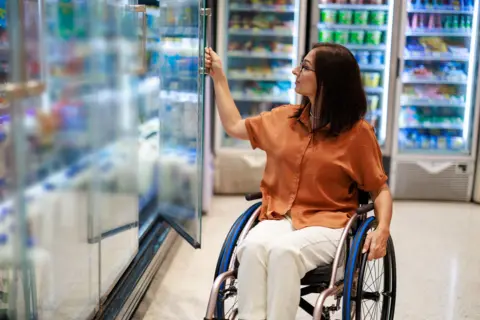[ad_1]
 Getty Images
Getty ImagesAfter years of encouraging shoppers to scan their own groceries, some supermarkets are checking out a move back to traditional tills.
Asda said it would put more staff on checkouts, while Morrisons admitted it might have “gone too far” with self-scan. Northern upmarket chain Booths has got rid of them altogether.
The dreaded “unexpected item in the bagging area” announcement is among a list of customer complaints about self-service tills.
But some shoppers told the BBC they’re happy to skip the queues and the chit chat if it speeds up their shop.
The debate over staffed versus unstaffed tills has continued to rumble on as the number of self-scan tills has increased over the past 20 years to some 80,000 in the UK.
Now Morrisons chief executive has claimed the store “went a bit too far” with the self-checkout. Although they drive some productivity, “some shoppers dislike it, mainly when they have a full trolley,” Rami Baitiéh, told the Telegraph.
He said the chain was now “reviewing” its number of self-service checkouts, with plans to remove some in favour of staffed tills.
His comments came after Asda pledged to put more staff on checkouts after admitting it had reached a limit with self-service tills.
Some have gone further. Booths – a smaller, upmarket supermarket chain based in the north of England – rid itself of the technology completely last November.
 Beverley Hyrb
Beverley HyrbFor Beverley Hyrb, from Oldham in Greater Manchester there’s a new nuisance when it comes to negotiating the self-scan. She is particularly turned off by the cameras on some of these tills that capture live footage of the user.
“You see an image of yourself moving about and I don’t like it,” the 62-year-old said. “I’d rather get in a queue.”
Stores could be using the technology to discourage shoplifting, after such cases in England and Wales hit the highest level for 20 years in April.
Ms Hyrb added that there were mental health benefits to speaking to someone when grocery shopping.
“Especially if you’re living on your own. Doesn’t matter if it’s about the weather or the news or whatever, it’s just good to chat.”
For others self-checkouts are not merely annoying, but a challenge to use.
“As a deaf person, I can’t hear the beep when I scan items so I’m always getting in a tangle with them as they don’t always scan correctly,” said Anna Kenyon from Manchester.
She said people – as opposed to machines – are much better at adapting to her condition. Like Beverley, she appreciates the human touch.
“I’ve had some lovely interactions in Aldi where a checkout assistant spontaneously started signing with me. Little moments of connection like that are lovely.”
 Anna Kenyon
Anna KenyonJulie Yates has two adult sons who have autism and said self-checkouts allow them some independence.
“They don’t have to interact with anyone, they can be in and out and gone,” she said. “They don’t have to make eye contact or small talk.”
“My mum and I, we go to a [staffed] checkout,” Ms Yates said. “It’s a little social interaction, it can be a nice part of the day.”
Others simply prefer self-checkout because they find it quicker.
For 74-year-old Trevor Springford from Dunbar in East Lothian “it’s all about getting in and out fast without having to queue, get involved in a conversation or field questions.”
For people like Trevor, it is welcome news that self-checkouts won’t be going away entirely anytime soon.
As for those who loathe them, they may start to see a few more staffed tills in future.
The British Retail Consortium which represents most of the UK’s major supermarkets would not be drawn on whether this was the start of a phasing out of self-scan. A spokesperson told BBC News: “Retailers will adapt check-out systems across their different stores to meet the diverse needs of their customers.”
Ged Futter, director of supermarket consultancy The Retail Mind, agreed that customer feedback is king when it comes to these kinds of shifts in retail.
“At the moment, I think it’s particular to those two retailers [Asda and Morrisons],” he told BBC Breakfast.
One of the benefits self-scans bring to supermarkets is they cut staff wage bills, but if it impacts on customer experience, it’s bad for business.
“The retailers themselves will always be looking at costs, [but] sometimes when you’re looking at costs, you can go too far,” Mr Futter said.
“Successful retailing is all based on feedback from the customer. It’s about understanding your customer,” he added.
BBC News contacted all the UK’s major supermarket chains to ask whether they were changing their till set-up. Tesco, Lidl, Co-Op and Waitrose said they would continue to offer both.
Marks and Spencer said their stores had different formats for different customer needs, but all stores with staffed tills always has at least one open for checkout.
Aldi and Sainsbury’s did not respond to requests for comment.
Tesco said it introduced self-checkout tills nearly 20 years ago. A spokesperson for the country’s biggest supermarket said: “We are proud to offer customers choice when it comes to checking out and customers can always ask a colleague for a manned till to be opened.”
 Getty Images
Getty ImagesBut Fazilet Hadi, head of policy at Disability Rights UK, said customers should not have to ask for a staffed till to be opened. “They’re not always that visible, these staff. What if I can’t see them?”
However she acknowledged that reasonable adjustments for people with disabilities “have to be proportionate”.
“What’s reasonable for a multi-million pound chain may not be reasonable for a corner shop,” she said, but added that choice was important as everyone’s needs are different.
Mel Merritt, head of policy and campaigns at the National Autistic Society, said some people “may prefer the reduced level of social communication and interaction which a self-service checkout provides”.
“Others may need more support while shopping and may benefit from having staff at checkouts who can help,” she added.
[ad_2]
Source link




